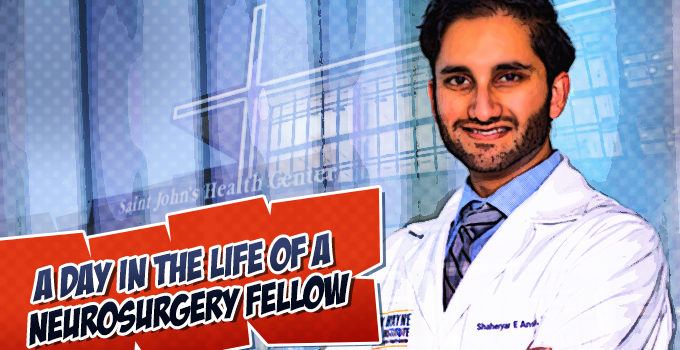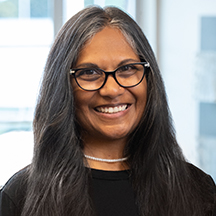

A Day in the Life of a Neurosurgery Fellow
by Guest Author
What is it like to be a brain surgeon? Take a look behind the scenes and follow a young doctor through his day as a neurosurgery fellow in a busy practice at Pacific Neuroscience Institute in Santa Monica, California.
* * *
The phone rang. It was 2 am on Monday morning in Santa Monica and the on-call neurosurgeon looked at the text from the hospital. In the OR on Sunday, the doctor along with a team of specialists, had removed a large benign pituitary adenoma from under a woman’s brain through her nose. It had taken five hours because of complications with the size of the tumor. Now, almost 14 hours later, Mrs. Reed’s blood pressure was dropping and she was becoming lethargic.
Shaheryar Ansari, MD, checked the message again, made the short drive to Providence Saint John’s Health Center and went up to the patient’s room. He spoke briefly with the nurse, and in the quiet of the night Dr. Ansari went in to check on his patient. A few moments later he emerged ready with a plan of action. The patient had low cortisol after surgery for Cushing’s disease which was not unusual but would need to be taken care of right away.
Just a few hours later, at 6:30am Monday morning, Dr. Ansari was back to check on Mrs. Reed during his hospital rounds with Pacific Neuroscience Institute nurse practitioner and neurosurgery fellowship director Amy Eisenberg. The patient had received hydrocortisone and was back on track for a normal recovery. Dr. Ansari would check on her every day until her discharge from the hospital three days later.
Satisfied with his patient’s status, Dr. Ansari walked over to the Pacific Neuroscience Institute clinic to update his neurosurgical mentors, well-known neurosurgeons Daniel F. Kelly, MD, and Garni Barkhoudarian, MD, FAANS. Mondays and Fridays are busy clinic days, and all three neurosurgeons dove into their schedules seeing new and follow-up patients with brain, pituitary and skull base tumors. Patients needing minimally invasive endoscopic surgery to remove benign or malignant tumors were usually scheduled for Tuesday through Thursday. Due to her relatively severe symptoms, Mrs. Reed had undergone surgery over the weekend.
* * *
It takes many traits to be a neurosurgeon – focus, tenacity, precision, endurance, empathy, passion. And to become a great one, well, that is determined by how deeply committed the surgeon is to their craft and how dedicated they are to their patients.
Dr. Ansari joined Pacific Neuroscience Institute in the summer of 2018 to begin a year-long rigorous neurosurgery fellowship in minimally invasive surgery for brain, pituitary and skull base tumors with Drs. Kelly and Barkhoudarian. It is a challenging program meant for only the most determined candidates.
“I’ve been fascinated by the nervous system ever since high school, when I heard about the story of Phineas Gage – a railroad worker who, in the 1800s suffered a penetrating injury through his frontal lobes when an explosion drove a stake through his head. Although he survived, the previously mild-mannered worker became insolent, profane, and uninhibited. I was amazed that the brain could take such an injury and the person live, but the sudden change in his personality implied a mystery that pulled me in – I was hooked. I decided then I wanted to work with the brain. Since childhood, I have enjoyed building and tinkering and working with my hands. Neurosurgery seemed a natural fit for me.”
A biology major from University of Kentucky, Dr. Ansari graduated summa cum laude, and at Indiana University School of Medicine, he graduated top of his class. He remained at IUSM for his neurosurgical residency. Dr. Ansari has been heavily involved in academics and service-learning, and as a strong proponent of education believes that teaching is an essential tool. During his 3rd and 4th year of medical school, he chaired the Indiana University Student Outreach Clinic, the free, student-run clinic of IUSM.
Dr. Ansari’s desire to learn more about treating neurological disease and advancing surgical craft brought him to PNI. “One of my goals is to be able to contribute to the solutions that are needed to heal people who suffer from the problems of the nervous system.”
PNI’s fellowship, conducted in collaboration with Saint John’s Cancer Institute, is a clinical training program focused on endoscopic endonasal and keyhole surgical approaches, neuro-endoscopy, pituitary tumor management and multimodality neuro-oncology treatments—the kinds of techniques that Dr. Ansari is interested in pursuing. The fellowship emphasizes operative and peri-operative patient management, outpatient evaluation of new patients and follow-up patients as well as clinical and anatomical laboratory research projects.
Dr. Ansari has taken advantage of PNI’s resources, and his schedule includes clinical time with patients, gaining hands-on experience in the OR treating an extensive range of brain, pituitary, and skull base tumors, honing his skills in minimally invasive endoscopic neurosurgical techniques in the microdissection anatomy lab, and rounding at Providence Saint John’s Health Center. In addition, he presents at the multidisciplinary monthly Brain Tumor Conference.
He has been able to continue doing research, which is a particular interest. Already with more than a dozen publications in the neurosurgery medical literature to his name, much of Dr. Ansari’s research at PNI is based on evolving minimally invasive alternatives to traditional cranial approaches. He has presented some of this work at the North American Skull Base Society.
“My experience at Pacific Neuroscience Institute has been phenomenal. The experience of working alongside Drs. Kelly and Barkhoudarian has allowed me to learn a whole new set of skills and achieve to the best of my capabilities,” says Dr. Ansari. “ It has been an incredible opportunity for me.”
When his fellowship ends in June, like any other skilled professional, Dr. Ansari hopes to continue onto successful practice. He has already secured a neurosurgical position in Indianapolis at Community Health Network and is looking forward to gathering more skills, knowledge and expertise. “This year in sunny Santa Monica has been wonderful. Now I’m ready to head back to my roots where I can serve the community where I started my journey. I hope to build an innovative practice focusing on minimally invasive cranial and pituitary surgery.
The road ahead for Dr. Ansari is bright. He believes that even with all the training and practice, a doctor does and should feel the pressure of saving a patient’s life. He is in a profession that requires him to practice patience and resilience, and despite the workload, Dr. Ansari believes in living a balanced life with family and friends. Staying healthy and in good physical condition are important to him as well, helping him ensure the health of others.
* * *
On Monday evening Dr. Ansari checked in on Mrs. Reed before he headed over to the gym. Barring any complications, his patient’s recovery would be smooth and she would be discharged just a few days after surgery with no visible scars.
* * *
Reflecting on the impact his work in his chosen profession, Dr. Ansari says, “It’s important to keep things in perspective and see the results of your efforts. Then it is very easy to do what you do. A patient’s gratitude means a lot and their trust in you is priceless.”
For more information about PNI’s Neurosurgery Fellowship Program contact Amy Eisenberg, MSN, ARNP,CNRN, Fellowship Director.
Author note: Patient is fictitious.

Mahyar Pakizegee is a fourth year baccalaureate student at the University of California, Los Angeles majoring in History. His goal is to attend medical school and pursue his dream of being an inspiring physician. He is a contributing author under the guidance of Dr. Garni Barkhoudarian, neurosurgeon at Pacific Neuroscience Institute.

Zara Jethani, MS, MBA, is the marketing director for the Pacific Neuroscience Institute. Her background is in graphic design, molecular genetics research and healthcare marketing.
Last updated: July 11th, 2025